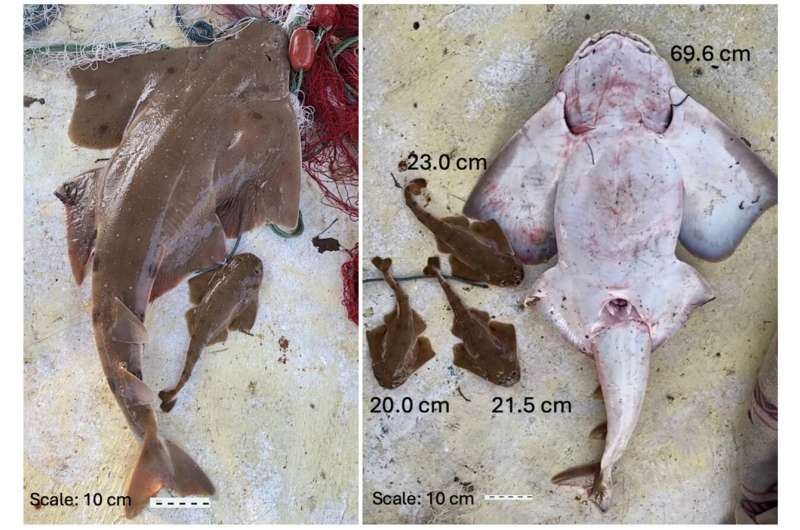This article has been reviewed according to Science X's editorial process and policies. Editors have highlighted the following attributes while ensuring the content's credibility:
fact-checked
trusted source
proofread
New study identifies potential protection areas for critically endangered sharks in Türkiye

Three potential Critical Angel Shark Areas (CASAs) have been identified in the Eastern Mediterranean, specifically in Türkiye's Fethiye Bay and Antalya Bay, which are part of the Turkish Riviera, and the Çanakkale or Dardanelles Strait, in the northwestern part of the country.
In a recent study published in the journal Fishes, researchers with Mersea Marine Consulting, the Sea Around Us initiative at the University of British Columbia and the Shark Trust assembled and standardized new records of the critically endangered angel shark, smoothback angel shark and sawback angel shark in Turkish waters from 2018 to 2023.
They not only confirmed that there are some individuals left, but also detected the areas where the animals are most likely to feed and reproduce, the fishing gear that jeopardizes their survival, and the strategies that can be taken to avoid pushing them toward extinction.
"We identified 80 recent angel shark specimens found in Turkish waters. This is an important finding, as these species have a high risk of extinction in the wild, with population reductions of at least 80 percent having occurred in the past three generations," said Dr. Aylin Ulman, director of Mersea Consulting and lead author of the paper.
"These sharks are particularly vulnerable to bottom trawls and bottom-set gillnets because they are 'lie-and-wait' ambush predators that bury themselves in the seafloor sediment and suddenly emerge to catch unsuspected prey."
The angel shark records were gathered mostly from local small-scale fishers who incidentally caught angel sharks, from social media accounts and a few records from scientific literature. These fishers received training on how to submit their catches to the project team after being informed about the importance of the study and the IUCN Critically Endangered status of angel sharks. They were also made aware that, under Turkish law, fines are only imposed for transporting and selling sharks and not for incidental bycatch.
"All three angel shark species are protected under the National Fisheries Law, which means that fines of US $850 are imposed on those who catch them on purpose, transport them or sell them. Lack of proper understanding of the law means that fishers tend to be unwilling to report any prohibited species," Dr. Ulman said.
"However, once they are made aware through outreach campaigns that they won't be penalized for incidental catches which are released, fishers are more willing to share their records, thus improving the scant knowledge of the biology and distribution of angel sharks."
In addition to exchanging information with fishers, the researchers showed them how to prioritize the safe release of sharks, as angel sharks, particularly, remain alive when entangled in fishing gear due to their natural low oxygen requirements. Only extreme cases result in mortality.
These interactions resulted in the reporting of 38 individuals in Fethiye Bay, 18 individuals in the Northern Aegean Çanakkale District and 17 individuals in the Antalya Bay Region, with the remaining seven individuals located in other regions.
With this information, including the fact that some of the female sharks caught in the springtime were pregnant and gave birth to their pups when entangled in the nets, the researchers propose the establishment of Critical Angel Shark Areas in Çanakkale and Fethiye, which host spawning habitats.
In the case of Finike Bay, which is part of Antalya Bay, fishers report that smoothback angel sharks are normally encountered in fishing nets targeting shrimp, as once shrimp are caught in the net, the angel sharks come to feed on them. Thus, the area is a known feeding ground that could be turned into a CASA.
"Based on reproductive events, feeding areas and specimens found, this study suggests that Türkiye hosts several Critical Angel Shark Areas that could be important for the survival of the species in the Mediterranean Sea," said Dr. Daniel Pauly, co-author of the study and principal investigator of the Sea Around Us initiative.
"Key information related to Marine Protected Areas, fishing, tourism activities, marine traffic, and oceanographic data will soon be layered onto these CASAs to understand how areas are being utilized and who the interested parties are in order to facilitate better decision-making for the future protection of these areas."
Besides incorporating their data into the Mediterranean Angel Shark Regional Action Plan and Subregional Action Plans covering Türkiye, the researchers used the information as evidence to list an area in the Southeastern Aegean Sea as an International Union for the Conservation of Nature Important Shark and Ray Area. Their request passed external review in July 2023.
More information: Aylin Ulman et al, Identifying Potential Critical Angel Shark Areas in Türkiye, Eastern Mediterranean Based on New Records of Squatina spp. Identified through Fisher Engagement, Fishes (2024). DOI: 10.3390/fishes9070270
Provided by Sea Around Us





















